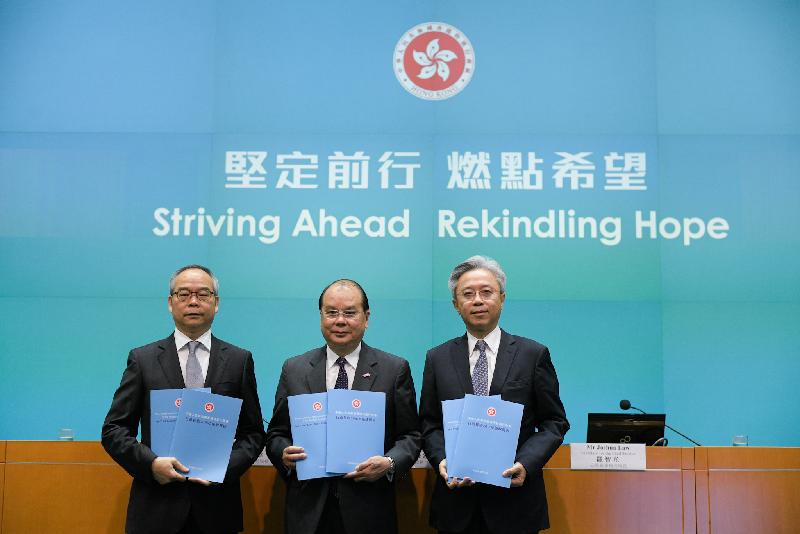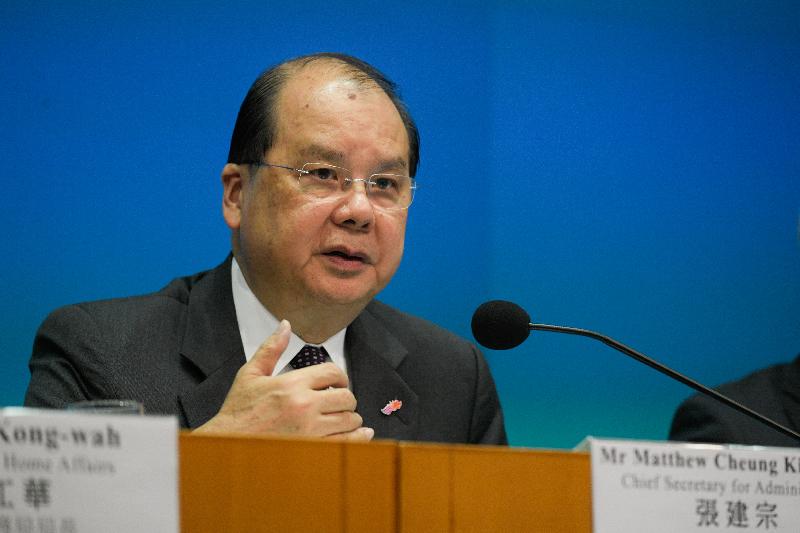The Chief Secretary for Administration, Mr Matthew Cheung Kin-chung; the Secretary for Home Affairs, Mr Lau Kong-wah; and the Secretary for the Civil Service, Mr Joshua Law, today (October 12) held a press conference to elaborate on initiatives in the "The Chief Executive's 2018 Policy Address" for nurturing talent. Following is the transcript of remarks at the press conference:
Reporter: I would like to ask a few English questions. Just now you talked about the youth development, using the fund to help young people go to the Mainland in the Greater Bay Area for the innovation development. Can you explain, what are some of the difficulties for them right now, in terms of going to the Mainland to do some start-up projects? What are some of the difficulties that they are facing right now? And you talk about co-operating with some organisations to help them to go to the Mainland, but is it because the response in the past has been very lukewarm, that’s why you have to initiate more organisations to help these young people? And also, are you worried about a talent drain in Hong Kong, because you are emphasizing this Mainland project, other than asking young people to stay in Hong Kong to start thinking about new ideas for innovation? And also, for ethnic minorities, there doesn’t seem to be any concrete measures being proposed in the Policy Address, other than just injecting $500 million for the ethnic minorities. Are there any concrete measures to help these ethnic minorities in Hong Kong?
Chief Secretary for Administration: Right, okay, let me attempt to answer this question. The first question is on youth development, Greater Bay Area. Our objective is quite clear – we want to play the role of a proactive facilitator, and also to really support youths who are interested to really start their own career, at least try the new pathway. It’s entirely up to our young people to decide what they want to do, but we want to give them an additional choice in this Greater Bay Area, alright? Another runway for them to take off. And in the process, not only funding is important – material support, connections, information flow as well, otherwise they will be operating in a vacuum. You can’t just go into the Greater Bay Area yourself and find a job, not to mention starting a business. So you need a data base, a platform, from which you can actually take off. So we are now constructing this platform, in terms of material support, counselling, in terms of financial assistance, the seed money for example, and also in terms of guidance and mentorship. But all these come in a package, a multi-pronged approach. My objective as the CS overseeing a lot of these committees is to promote upward mobility for our young people, give them more choices, not a job, but a career. And in fact it’s not just the Greater Bay Area. If they go to the Greater Bay Area they can also come back to Hong Kong. In the process they gain a lot in terms of exposure, in terms of connections, in terms of networking as well, particularly in business, in start-ups and all that, and all this networking will stand them in very good stead in future career development.
The second question is ethnic minorities – I chair the Steering Committee on Ethnic Minorities. It’s covered in the Policy Address. This is the pamphlet, a lot of concrete measures here. If you look at the pamphlet, it’s not in English and Chinese only, but also in six different languages catering for ethnic minority groups in Hong Kong. We are talking about really making full use of these $500 million earmarked for this exercise to help them on all fronts including employment. We will provide them with case management support through NGOs and also education, particularly the learning of Chinese as a second language. We will be providing more financial support, more teacher support at kindergarten. We want to teach them up front, learn the language up front, not when they get old or when they are in secondary schools but we start with kindergarten. In fact, in my discussion with a lot of parents they want their kids, particularly the EM parents, to learn Chinese from day one when they enter kindergarten. So the whole package is here, alright, costing probably $600 million, more than what I’m supposed to spend.
(Please also refer to the Chinese portion of the transcript.)
Follow this news feed: East Asia







